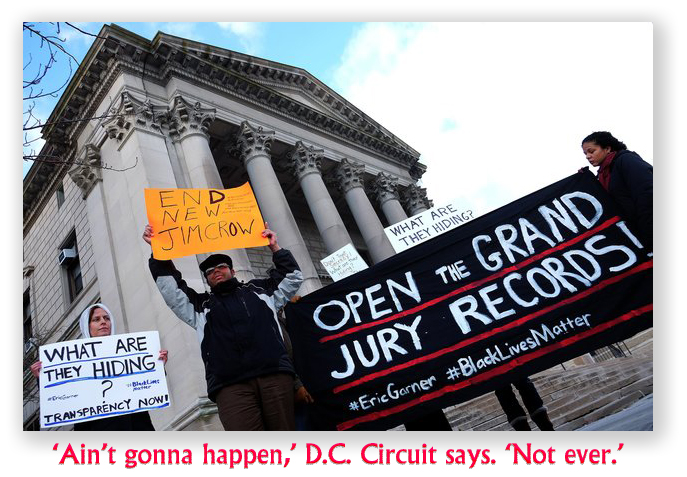We post news and comment on federal criminal justice issues, focused primarily on trial and post-conviction matters, legislative initiatives, and sentencing issues.

GRAND JURY RECORD ACCESS FURTHER CURTAILED
A lot of prisoners start preparing for post-conviction filings by filing motions with their district courts demanding grand jury transcripts. And they are always turned down. And they fume and fuss, never appreciating how stout the walls protecting grand jury secrecy really are.
Last week, the D.C. Circuit made getting breach the grand jury-secrecy walls even more daunting.
 Let’s start with a simple primer. Grand jury proceedings are secret.
Let’s start with a simple primer. Grand jury proceedings are secret.
And for good reasons. First, because prosecutors can drag any smell old carcass in from the the grand jury panel, a lot of not-so-accurate dirty laundry belonging to people who never end up being charged with a crime could be aired if the records were open. Second, because there is neither a moderating judge nor defense counsel present at a grand jury, all sorts of scurrilous and inadmissible drivel can be dumped into the record, matters that should never be made public so as to shame the subjects, even if they are guilty of some criminal offense or another. Third, witnesses may be cowed if required to testify against someone who has not been publicly charged for fear that their allegations, even if true, may cost them their reputations, employment or even physical safety.
For those reasons, Rule 6(e) of the Federal Rules of Criminal Procedure severely limits the ability of anyone other than the government (naturally) to access grand jury material. Specifically, a defendant may obtain grand jury records of his or her own proceeding only (1) “preliminarily to or in connection with a judicial proceeding;” or (2) if the defendant is able to show “that a ground may exist to dismiss the indictment because of a matter that occurred before the grand jury.” The second ground is especially circular: in order to obtain any information about the matter before the grand jury, a defendant has to already have information about the matter before the grand jury.
The non-lawyer in us can only be wistful, imagining all of the historically-fascinating information contained in closed grand jury records. Think of the grand jury records relating to the Lincoln assassination, Al Capone, Alger Hiss, the Rosenbergs, the Chicago 8, Watergate… Interesting stuff, if you could get to see it.
Historian Stuart A. McKeever is a guy who wants to see some of it, specifically grand jury records from the 1957 indictment of FBI agent John Joseph Franks, whom Stu figured was involved in making a prominent critic of Dominican Republic dictator Rafael Trujillo disappear. Stu said he needed the grand jury records for a book he’s writing on the critic’s disappearance.
 Stu asked the district court that heard the Franks case to release the grand jury records for their historical interest and merit. His request was not based on any of the exceptions in Rule 6(e)(3)(E) of the Federal Rules of Criminal Procedure, but instead on the district court’s inherent authority to disclose historically significant grand jury matters. The court agreed it had such authority.
Stu asked the district court that heard the Franks case to release the grand jury records for their historical interest and merit. His request was not based on any of the exceptions in Rule 6(e)(3)(E) of the Federal Rules of Criminal Procedure, but instead on the district court’s inherent authority to disclose historically significant grand jury matters. The court agreed it had such authority.
Last week, the Circuit Court reversed the district court. It noted that Rule 6(e)(2)(B) prohibits disclosures about grand jury matters “unless these rules provide otherwise. The only rule to ‘provide otherwise’ is Rule 6(e)(3). Rules 6(e)(2) and (3) together explicitly require secrecy in all other circumstances.
“Where Congress explicitly enumerates certain exceptions to a general prohibition,” the Court said, “additional exceptions are not to be implied, in the absence of evidence of a contrary legislative intent… The Rule on its face prohibits such a communication because it does not except it from the general prohibition. It would be most peculiar to [stress] that the exceptions in Rule 6(e) must be ‘narrowly construed,’ yet to hold now that they may be supplemented by unwritten additions.”
McKeever v. Barr, 2019 U.S. App. LEXIS 10061 (DC Cir. Apr. 5, 2019)
<><>
– Thomas L. Root

